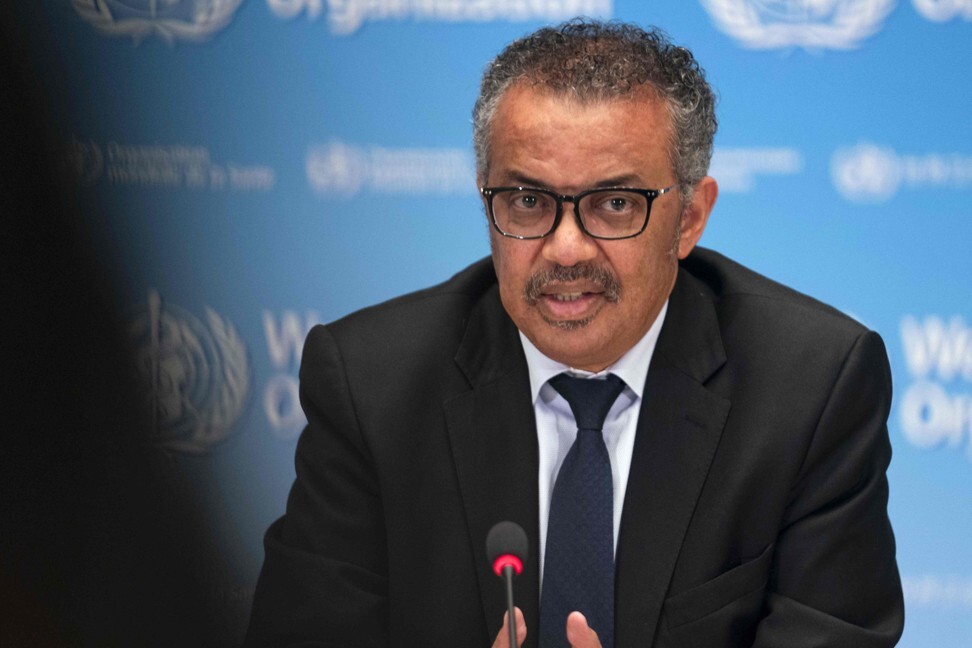‘Lose, lose, lose’: Trump’s decision to quit WHO ‘may sink Taiwan hopes of role in agency’
- Amid the Covid-19 pandemic, Washington has lobbied hard for Taipei’s observer status but its withdrawal may harm the bid
- Questions raised about the timing of Trump’s decision to quit and defund WHO in the middle of a pandemic in which over 100,000 Americans have died

US President Donald Trump’s decision to withdraw the United States from the World Health Organisation would only result in a lose-lose-lose situation for Washington, Taiwan and the global health body, analysts said on Tuesday.
While it is not clear how the president can unilaterally withdraw the US from the WHO without approval from Congress, Taiwan, which has been fighting hard to get a role in the agency, is tipped to suffer from his decision, according to observers.
Trump said on Friday he would terminate US ties with the Geneva-based body, of which Washington had been a founding member since 1948, and halt funding for it. Trump has accused the WHO of helping the Chinese government cover up the early days of the coronavirus pandemic in China.
The stated withdrawal comes amid growing tensions between Washington and Beijing over a spate of disputes, including trade, technology, Chinese military expansion in the Indo-Pacific region and the coronavirus outbreak.
But Trump’s decision has raised questions over whether he could actually bypass the US Congress to halt the funding for the WHO, especially after the financing has already been approved by Congress.
It has also raised questions over whether this is a proper time for the US to withdraw while America is still under the serious threat of the pandemic, whether it would hurt the international standing of the US and whether it would damage Taiwan’s WHO bid.
“Trump’s decision to withdraw the US from the WHO is ill-considered, a self-inflicted wound to our global standing,” said Larry Diamond, a senior researcher at Stanford University’s Hoover Institution.
Diamond said there were serious problems with the World Health Organisation right now, including excessive Chinese influence.
“But withdrawing the US from the body will only make that worse, and will of course weaken not only our position but also Taiwan’s quite justifiable request for observer status,” he said, adding: “It’s a lose-lose-lose proposition for us, and China becomes the big winner.”
Taiwan, which has maintained close substantive ties with the US despite Washington’s diplomatic recognition of Beijing, has been seeking to join the agency for decades. It was allowed to be an observer of the World Health Assembly between 2009 and 2016 when Ma Ying-jeou of the mainland-friendly Kuomintang was president and adopted a policy to engage Beijing.
But since Tsai Ing-wen of the independence-leaning Democratic Progressive Party was elected president in 2016 and refused to accept the one-China principle, Beijing has suspended official exchanges with Taipei, staged a series of war games near the island and poached seven of Taiwan’s allies to try to force Tsai to change her mind.
It has also told the WHO that without China’s consent, the secretariat must not issue any invitation for Taiwan to take part in the World Health Assembly as an observer.
Amid the Covid-19 pandemic, Washington has lobbied hard for Taiwan’s observer status, citing the success story of the self-ruled island in containing the outbreak as evident by its relatively small number of infections – 443 – and seven deaths so far.

“If the US indeed drops out, it loses the ground to convince others to support Taiwan’s pursuit of membership or observer status,” said Alexander Huang Chieh-cheng, a professor of strategic studies and international relations at Taipei’s Tamkang University.
Noting that there was a need for Taiwan to fight for participation in the WHO, Huang said that unless China made a mistake, Taiwan’s limited diplomatic allies – now down to 15 – “would have more difficulty to rally support for Taiwan”.
Under the original plan, the US would continue to lead a global campaign to strive for Taiwan’s observer status and the other allies would raise proposals in the WHA when it reconvenes in November, in line with a decision at last month’s virtual meeting.
Taiwan’s foreign ministry said on Tuesday that the island would continue to seek participation in various WHO mechanisms, meetings and activities, and would strive to attend the WHA as an observer. It added that the ministry would continue to seek to understand the US decision and its impact on Taiwan as well as other like-minded countries through various channels.
The American Institute in Taiwan, the US de facto embassy in Taiwan in the absence of formal ties, expressed its support for the island’s membership issue.
“We have long supported Taiwan’s membership in international organisations where statehood is not a requirement. In international organisations where statehood is a requirement, the United States supports Taiwan’s meaningful participation,” the institute said.
“The current global pandemic makes this position more essential than ever. Taiwan is a democratic success story, a reliable partner, and a force for good in the world. The United States remains committed to supporting Taiwan as it seeks to expand its already significant contributions to addressing global challenges.”